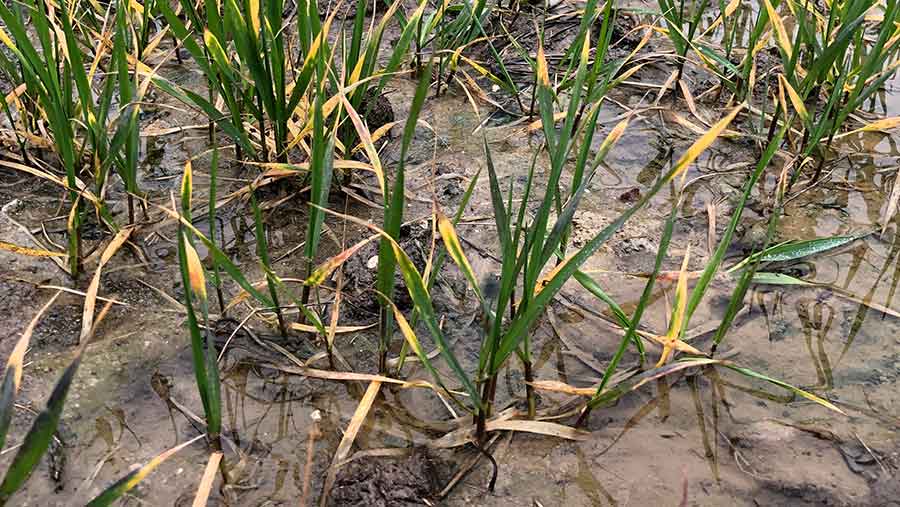Huge cuts to wheat and rapeseed plantings for harvest 2024
 Winter wheat shows the strain of excessive moisture © MAG-Philip-Clarke
Winter wheat shows the strain of excessive moisture © MAG-Philip-Clarke Delayed spring plantings due to the rain and extensive damage to winter crops which did make it into the ground suggest the UK is facing the smallest wheat area in four years.
According to the AHDB’s Early Bird Survey, the UK wheat area is forecast to be down 15% at 1.46m hectares for harvest 2024.
This area could be reduced even further if the adverse weather in the coming weeks continues to affect planting and potential yields.
There is also a 28% decrease in the estimated rapeseed area at 280,000ha, and a 22% reduction in the winter barley area at 355,000ha.
See also: Further wet weather raises fears of harvest catastrophe
Lower production forecasts will leave the UK market more dependent on imported grains and it could affect livestock sectors, with a tighter supply of straw expected later in the year.
More than 550,000ha of arable land is forecast to be left fallow for harvest 2024, a 79% increase on the year.
Late plantings
AHDB senior analyst Helen Plant said: “Farmers still have the chance to plant crops such as spring barley and oats, but if heavy rain continues, crops will be planted at a point where they may become economically unviable
“We are heading to the point where spring-sown winter wheat varieties will not be able to develop sufficiently to provide a viable crop.
“There is a clear intention to plant more spring wheat, but the persistence of wet weather means there is uncertainty about whether this can be done.”
Spring barley has bucked the wider trend and is expected to be up by almost 30% at 881,000ha as a result of a larger emphasis on spring cropping.
Similarly, the oat area has been increased from 167,000ha last year to 209,000ha for the coming harvest.
Wheat production
AHDB economics and analysis director David Eudall suggested that wheat production could fall from about 14m tonnes to 10m tonnes, or even less this year.
Mr Eudall said: “After seeing a period of heightened prices for cereals, the global market has now cooled off as supplies are strong around the world and the effect of the Ukrainian conflict has been absorbed into supply chains.
“So, while we may need to import more, we’re doing this at a point currently where prices have fallen.”
He added that there was a longer-term risk with the need for more imports increasing the UK’s exposure to global trade.
“A greater reliance on imports means that, as global prices rise due to weather or geopolitics, UK food producers using wheat would need to pay a higher price to attract wheat into the country rather than having access to a locally available supply.
“So, while current market conditions are favourable to consumers, they are not supporting farmers who are facing lower incomes and higher costs.”
He concluded: “If we see any gain in the global market through the coming season, it will be favourable for the bottom line of farmers, but could see a return to inflationary prices for consumers.”
